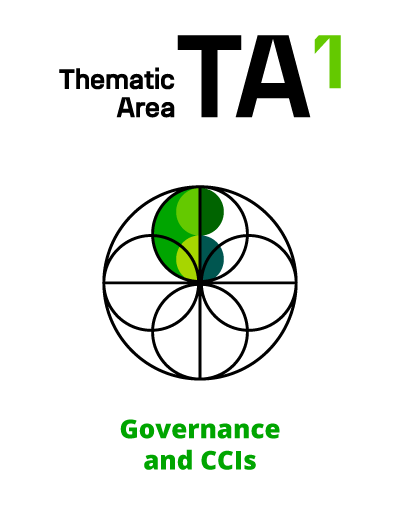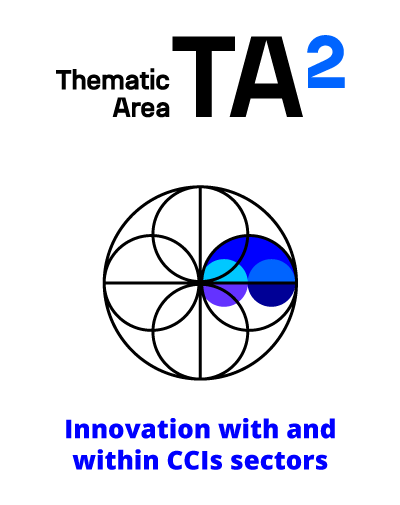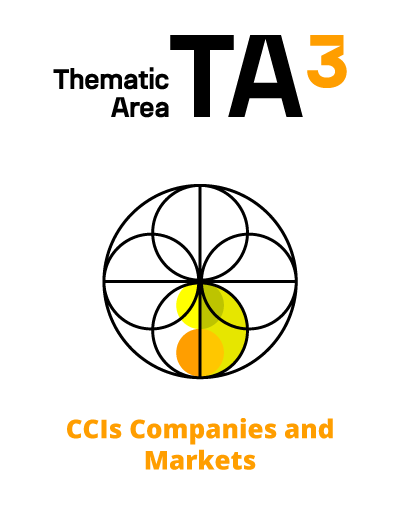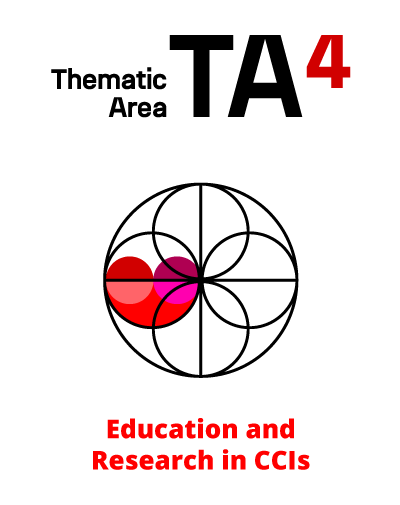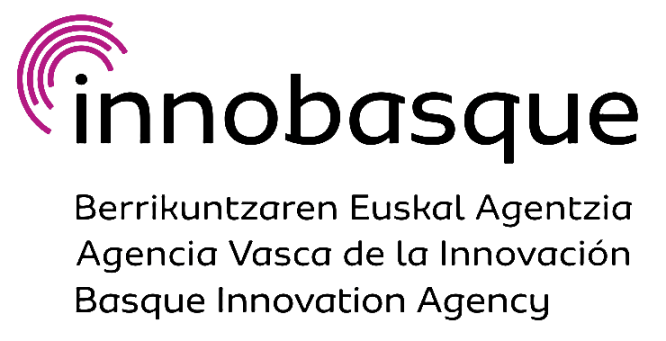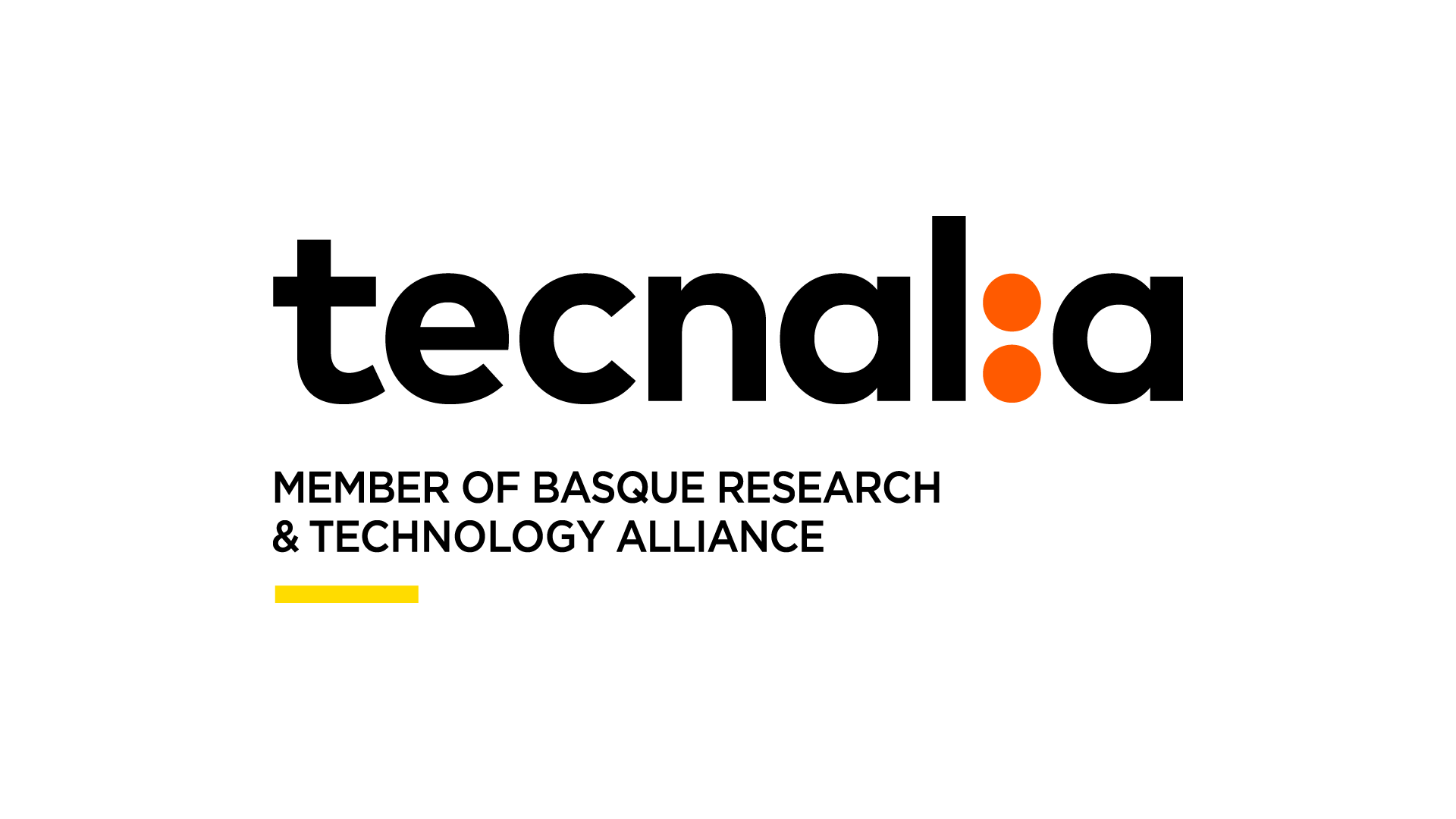Education and Research in CCIs
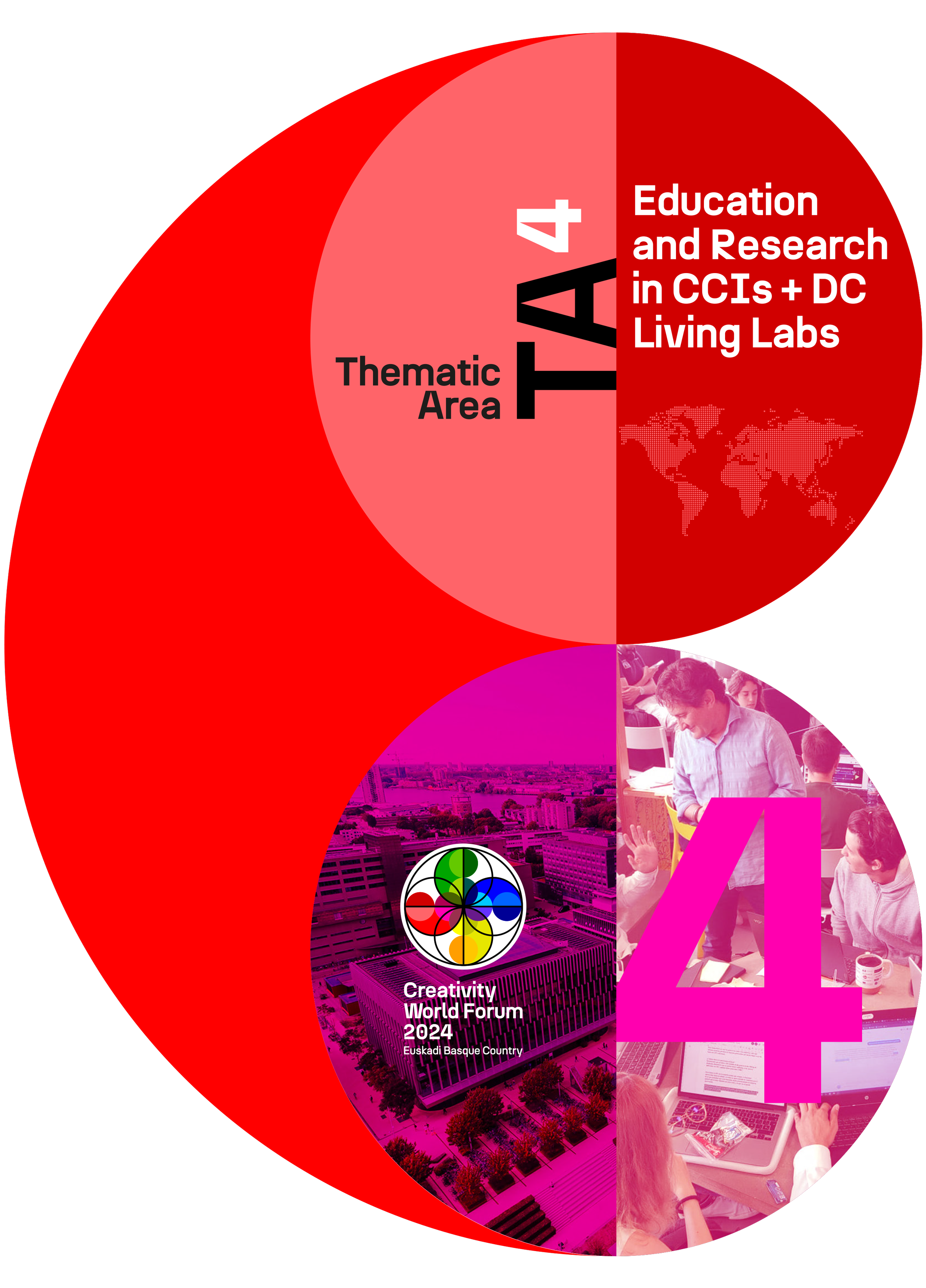
Education as a key tool for the creation of high-skilled, innovative and creative professionals acting as agents of change in a constantly evolving and challenging world.
Coordinating entity
Challenges
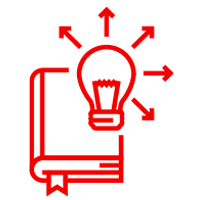
Challenge 1
New educational systems in need of creative, innovative and entrepreneurial skills
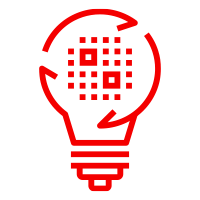
Challenge 2
Possible models, currents needs of CCIs sectors
The final selected cases for CWF 2024 within TA4 Education and Research in CCIs
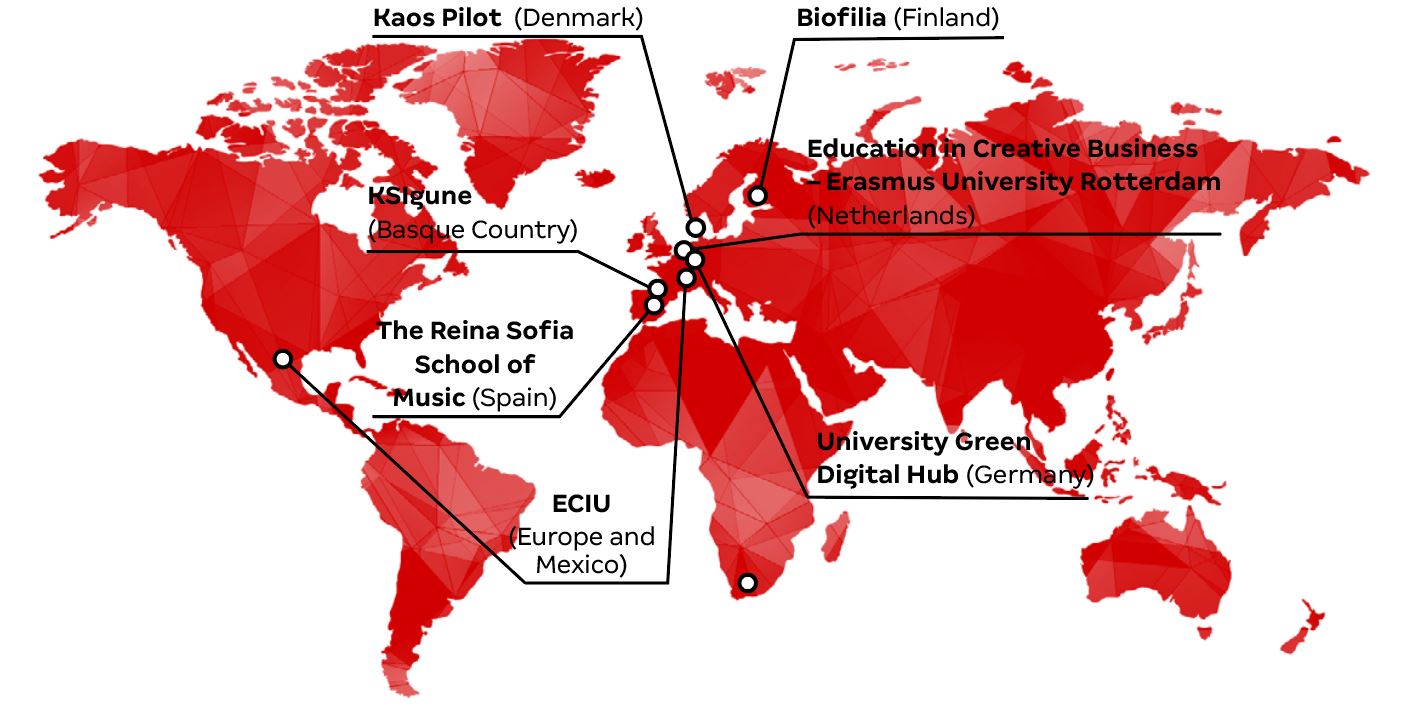
THE REINA SOFIA SCHOOL OF MUSIC. The Entrepreneurship and Social Innovation Programme within the Master's Degree in Music Performance

Challenge 1
New educational systems in need of creative, innovative and entrepreneurial skills
From
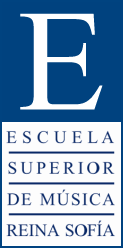
Contact person
Esther Viñuela
The birth
This project was born in 2016-2017 after an analysis that revealed that young musicians face a working landscape conditioned by multi-employment, temporality and mobility. The School’s concern with improving the education it provides and preparing its students for future professional careers results in the Entrepreneurship Programme, where students develop abilities beyond performance and become aware of the role they play as artists within society.
At the time of its conception -and today as well-, the program began to offer training in management skills or soft skills to performers and composers through a learning by doing methodology. Something that is quite unique about this program is that it is a compulsory subject for those musicians who will be solo performers or orchestral musicians. In most cases, this type of training is not offered to performers or it is not a compulsory subject as it is in this case.
The journey
Every year, around 20 students take part in this program where they put together a group project and they are given funding to develop it. During the conception and execution of the project, students learn about budget and administrative management or digital marketing but also teamwork, empathy or self-regulation.
The School, apart from financing the projects economically, provides the students with a tutor that guides and provides counsel during all the steps of the process. All projects are pitched directly by the students, and must tackle a challenge of social, artistic, technological or environmental nature.
The biggest barrier is the cultural change needed within the sector to change preconceptions and beliefs around what a professional career in music means. The first barrier therefore is the motivation of the students, which, although it improves every year, is always a challenge, and what lies behind this lack of motivation: an entire system that points out that what is learned in this subject is unnecessary.
The Entrepreneurship and Social Innovation Programme is possible thanks to the collaboration of Fundación Banco Sabadell and IF Foundation.
The positive impact
The objective of this subject is to facilitate a first-class education by providing the tools that classical musicians need to face contemporary realities, not only in terms of the market. The impact of the project lies in the transformation of the students, something that we monitor through case studies. However, here are some figures from the program.
- Number of projects developed: 42
- Number of students involved in the program: 140
- Number of beneficiaries of the projects: More than 100K
The growth and collaboration
The incubator: a new activity will be included in the program (with a pilot from the 23-24 academic year). This project incubator will provide the opportunity to continue developing 1 or 2 projects from the previous year.
UGD Hub – University Green Digital Hub. Erasmus+ programme

Challenge 1
New educational systems in need of creative, innovative and entrepreneurial skills
From
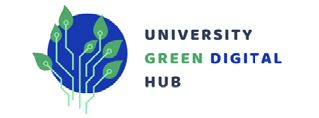
Contact person
Lizett Samaniego & Viktoria Heinzel
The birth
The project concept was developed by the lead partner University of Split – Croatia, the Media University of Stuttgart was invited to join as a collaborative partner for the implementation of the project in 2022.
The outcomes of the project aim to develop the basis for a sustainability oriented university education and to promote the development of digital and sustainable businesses that contribute in the long term to reducing the impact of climate change and creating a sustainable economy. Through various activities along the project, students and university staff members are being trained in topics like SDGS, Green Competences, Sustainable Business Development.
The journey
The journey has been smooth so far, as academic interest and the need for sustainable business has grown in recent years, it has been less of a challenge to engage the target groups to take part in the activities offered by the project. However, it has not been exempt from the usual problems of working in multicultural teams.
The positive impact
As a result of the project, an international University Green Digital HUB will be established, where students, staff and university startups will be given support for developing digital, green and entrepreneurial skills.
The main outputs of the project are:
- Developed and implemented DGE education program with target groups.
- Developed and implemented DGE Knowledge factory, web platform for e-learning, knowledge exchange and dissemination of project results.
Developed and implemented Greenpreneur startup factory program, support program for university startups in areas of green and digital innovation.
The growth and collaboration
The University Green Digital Hub programs will be utilized annually to enhance the skills of students, staff, and university startups at University of Malaga, University of Split and Stuttgart Media University
Non-higher education institutions (PCST, Preneurz, and IHS) will remain project partners in the developed programs as mentors, trainers, co-creators and co-organizers of different university events, and will join the Digital Green Entrepreneurial Advisory Board of the University Green Digital HUB together with other industry partners and associations, which the project partners will form upon the project completion. The DGE Advisory Board will help the project partners in regularly updating their programs to be aligned with the technology development and green practices.
They will be able to strengthen their partnerships and international programs with HEIs and use the developed programs in working with different groups.
Education in Creative Business - Erasmus University Rotterdam

Challenge 1
New educational systems in need of creative, innovative and entrepreneurial skills
From

Contact person
Amanda Brandellero
The birth
Innovative research and educational programmes on CCIs are at the core of the Erasmus School of History, Culture and Communication, based at the Erasmus University Rotterdam. Our faculty ESHCC is ideally positioned to pioneer cross-disciplinary collaborations, impact research and education relating to one of the fastest growing sectors of activity in the Dutch economic landscape, notably the CCIs. In our approach, we facilitate the coming together of different types of knowledge – theoretical, practical, from the humanities and social sciences – with the lived experiences of practitioners and citizens. Rotterdam’s thriving cultural and creative ecosystem provides an ideal base from which to explore how the CCIs can impact wellbeing, resilience and sustainable development. Erasmus University Rotterdam is now a lead partner in the European Institute of Innovation & Technology (EIT) Culture and & Creativity.
The journey
Over the years, the ESHCC has developed a comprehensive and highly reputed portfolio of research and educational programmes on the CCIs. In addition to international bachelor’s in media and communication and the arts and culture, we are co-founders of the Rotterdam Arts and Science Lab and related dual degree, in collaboration with the city’s arts academies. At the BA level we also offer a range of Minors which advance learning and practice in key CCI sectors, from the music and fashion industry to cultural heritage and art markets. We offer several specialized MA that focus on the CCIs. Our top-ranked MA in Cultural Economics and Entrepreneurship is unique and pioneering in its kind worldwide, focusing on the business side of arts and culture. We are also partners in Erasmus Mundus MAs, notably GLOCAL (Global Markets, Local Creativity) and MAGMA (Managing Art and Cultural Heritage in Global Markets).
The positive impact
Positive societal impact is at the heart of Erasmus University’s strategy. It follows that our CCI education and research programmes strive to support fairer, more sustainable and inclusive transitions in society at large.
The growth and collaboration
In our research and educational programmes, we foster and build upon partnerships in Rotterdam and beyond. In RASL, we work together with Rotterdam’s higher educational institutions specializing in the arts and creative industries (Willem De Kooning Academy; Codarts; Hogeschool Rotterdam). In our international MAs we partner up with counterparts in Barcelona, Glasgow, Lisbon, Paris, and Uppsala among others. With our partners, we are also developing innovative interventions in the city, such as the Cultuur&Campus Putselaan New European Bauhaus Lighthouse Demonstrator project.
Biofilia – Aalto University

Challenge 2
Possible models, currents needs of CCIs sectors
From
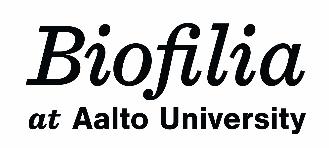
Contact person
Larisa Chernyaeva
The birth
The Biofilia laboratory and program was set up during 2011-2013 in close cooperation with Ionat Zurr and Oron Catts, artists and founders of SymbioticA – Centre for Excellence for Biological Arts in University of Western Australia. At the time Biofilia was the only bioart laboratory managed by an art institution.
Biofilia is a platform for experimentation, but it doesn’t provide independent content as such. Innovative approach of Biofilia lies in co-creation of science and art. Artists embody their ideas relying on scientific expertise provided by workshop master.
The journey
Founding of Biofilia took place at the same time there was constructed the totally new interdisciplinary Aalto University in Finland. The university is a combination of technical, business and art universities. Departments got extra funding for strategic openings and the Head of the Department of Art, Prof. Helena Sederholm, directed it to the bioart lab project.
One of the challenges was to set up and design an elegant molecular biology laboratory to the former clean lab of electrical engineering but belonging to Faculty of Arts. Later, Biofilia moved to the chemistry building. Innovative and collaborative spirit of Aalto University allowed to accomplish that.
At the Biofilia ABC introductory course artists study the basics of Molecular Biology needed to implement their artistic practices in Bioart lab.
The positive impact
Prominent artists have been working at Biofilia. Among them bioart pioneers Oron Catts and Ionat Zurr, Paul Vanouse, Andy Gracie, and Kira O’Reilly. Many art works were created in Biofilia, among them “An attempt to keep my friends alive: cell sculptures” by Pekka Vasantola, “Wombs” by Margherita Pevere, “Yeastograms” by Johanna Rotko. Biofilia is often under media attention.
Throughout 10 years, 162 art students have taken Biofilia ABC introductory course.
The growth and collaboration
Biofilia is open to visit for interested groups upon agreement.
Bioiflia actively collaborates with Finnish Bioart Society.
We plan to launch the course “Materials of Bioart” for Bachelor students to make an entry to bioart world easier and earlier on arts students’ way. There, students would meet various living materials used in Bioartistic practices. Biofilia collaborates with TRIE project in University of Lusofona to help establish similar facility there.
ECIU University

Challenge 2
Possible models, currents needs of CCIs sectors
From
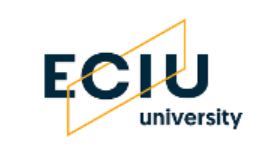
Contact person
Katrin Dircksen
The birth
The ECIU University is an initiative of the European Consortium of Innovative Universities (ECIU), a consortium of 13 like-minded universities in Europe and one partner in Mexico already existing since 1997. In 2017, the consortium decided to lift the collaboration to make a systemic change in Higher Education for the benefit of society. The ECIU believes that there is a need for European universities to create societal impact in the way universities do research, innovation and how education is provided. The flexible learning pathways of ECIU University respond to a rapid changing society focusing on exclusively open, time- and place-flexible, curiosity-driven and tailor-made education. In the ECIU University, learners, teachers, and researchers work with cities, communities, and businesses to solve real-life challenges. Challenge-based education (CBL), challenge-based innovation (CBI) and challenge-based research (CBR) are closely interlinked as learning takes place as part of a European research and innovation community.
The journey
With the ECIU University, ECIU aims at a systemic change in Higher Education in Europe to better respond to the needs and demands of society. In 2019, the European Commission launched the first call for “European Universities” to develop the idea of closer strategic collaboration among universities across Europe as part of the plan to establish a European Education Area by 2025. ECIU University was selected as one of the 17 pilot alliances and secured political support and follow-up funding from Erasmus until 2027. ECIU is currently working in an-EU funded project on a legal status for European Universities to recognize learning on European level, to facilitate pooling together resources, activities and data. ECIU University receives a lot of attention in EU level and EU member states level. Critical success factors are on economic, regulatory (dealing with 13 different national systems in Europe) and governance levels for such a novel approach towards European Higher Education. The above-mentioned EU funding is only partly financing the ambitions of ECIU University, next to other EU project, national funding and own universities’ resources. It is time-consuming to manage the patchwork of funding, while the goal is building an innovative European University that delivers a bold vision to strengthen European collaboration and has a transformative and long-term impact on society
The positive impact
- In the first three years (2019-2022) of the ECIU University: ECIU University Flexible Learning Pathways in place: After joint creating the frameworks, processes and products: 600 learners until 2022, working on 120 challenges and 285 micro-modules available, co-created by 150 teachers. The challenge-based way of working has brought together scientists, learners, business and citizens, strengthening the link between teaching, research, innovation and knowledge transfer. More than 100 municipalities, regions, NGOs and businesses provided challenges to ECIU University around SDG 11. In this field, also topics of the CCI have been included such as Resilient Communities, Media and information literacy, entrepreneurship and innovation: https://engage.eciu.eu/browse
- Long-Term Research Strategy and Citizen Science Platform established.
- Joint DXP platform launched: https://engage.eciu.eu/
The growth and collaboration
ECIU University demonstrates an invigorating new university model with multi-dimensional relations between ECIU University, its stakeholders and the ECIU member universities. The next step is to broaden up the activities going content-wise beyond SDG 11. In the ECIU University ecosystem approach, the ECIU universities are just players amongst others. Cities and regions are interconnected to maximise benefits of the ecosystem. NGOs, public organisations, the creative and cultural sector, private sector get access and participation in shaping knowledge and talent.
KAOSPILOT - Designing and Facilitating Learning Spaces programme

Challenge 2
Possible models, currents needs of CCIs sectors
From

Contact person
Simon Kavanagh
The birth
The LA emerged as I sought to make sense of the Kaospilot’s (undergrad) transformational 3-year program whilst I developed their new curriculum in 2009 as the new headmaster. I needed to understand and make explicit, the tacit nature of the intense emotional learning culture that had evolved since 1991 and learn how the learning journey was defined, designed, delivered, and measured. As a result, a visualised learning journey emerged. An assemblage of impact, value, subject, social, emotional, collaborative, and creative competencies with personal agency, craft and leadership. We could now play with the key parameters of Structure v Chaos, Frustration v Breakthrough, Action v Theory v Reflection.
The journey
We had created the CODE for transformational learning experience design. And, as a not-for-profit association, we decided to share it as an open-source methodology. We launched an affordable 3-day masterclass to share the Learning Arches (LA) methodology, Kaospilot pedagogy & learning philosophy. To date with the help of 15 amazing LA licensees in 15 countries, running it in 12 languages, we have trained over 6,000 Higher Education (HE) teachers, trainers, and consultants.
Like most educational & learning design methods, the primary barrier is one of resistance. With this in mind, we have designed the approach to meet the teachers & their students where they are at. We, apply an appreciative inquiry approach and use the LA for self-realisation & development through:
1. Consolidating current best teaching & learning practice.
2. Build confidence in the intuitive ability of teachers to design great learning.
3. Create collaboration for curriculum design & delivery.
4. Explore ‘how little structure is enough, to support teachers & invite students to take ownership of their own learning.
5. Create clarity and co-ownership of how to set, hold & land the learning journey, space, intention, deliverables and expectations.
The positive impact
Annually, we run approx. 50 LA training sessions globally and base our impact on the number of practitioners in HE institutions and their ability to inspire and train others in the LA methodology and offer free guidance for post course implementation. This is greatest in The Netherlands where we’ve trained over 1500 teachers. Recently, we are using LA to set safe DEIB learning spaces & communities. We also offer full and partial scholarships to the online training, with special focus on emergent countries like Africa & India to support regenerative farming, frontline training for HIV prevention in Uganda, training the trainers to train a new civic conversation to co-create solutions and social entrepreneurial school in Nepal.
The growth and collaboration
The growth of the LA design method will focus and continue to:
- to develop opensource tools and methods for inclusion, like these:
- The Learning Arch elements app; The learning arch design application (that can be localised to 450 languages; The 4D learning arch design process; Part 2 of the training already exists and is now going global and a Part 3 is in development, that will gather 30 learning arch experts to support 6 public educations to apply learning arches to increase mindset & practice based learning & evaluation. This is a new concept called training for impact, where participants pay with their time & energy. The first 2 cities are Cape Town and Lviv, Ukraine.
- Continue to grow our licensee base to run our training in new countries: fx: India, Indonesia, LATAM, Manila & Eastern Europe, Sweden & the UK.
- Continue to offer the Learning Arch design online courses for emergent countries and foundations, offering 50% of the participants full scholarships.
KSIGUNE - Basque Cluster for Culture and Creativity

Challenge 2
Possible models, currents needs of CCIs sectors
From
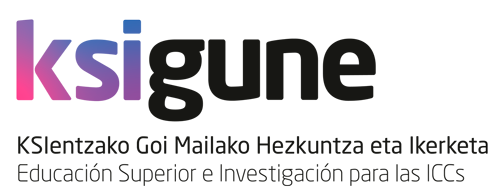
Contact person
Ruth Mayoral
The birth
KSIgune was born in 2020 as a strategic tool led by the Basque Ministry of Education, in collaboration with the Basque Ministry of Culture & Language Policy and Euskampus Fundazioa, with the aim to develop an ecosystem that connected the CCIs’ nodes (Academia, Business, Administration) in a cooperation model that enhanced their contribution to society. The added value of this cluster is how it approaches and favours cooperation between Higher Education centres and agents of the CCIs sectors, from a multidisciplinary and cross-sectoral approach, in the RIS3 Euskadi Creative context. The current and expected results of this cooperation are projects based on knowledge transfer (from Education to business and vice versa) and training in response to the demands of the CCIs sectors.
The journey
KSIgune is the sister initiative of 4gune – Basque Cluster for Engineering, Science and Technology. Following 4gune’s clustering model (2017), KSIgune has worked hand in hand with the Higher Education and the professional sector through 4 lines of action: Monitoring (visualisation of the educational offer in CCIs and analysis of the representation of the CCIs sectors in the Higher Education system); Training (analysis of the gaps and design of training plans for upskilling and reskilling); Transfer (connection of the ecosystem’s nodes to jointly respond to the CCIs demands and the global challenges); and Dissemination & Internationalisation (collaboration with European and global projects to enhance the impact of the ecosystem).
The positive impact
In a short period of 3 years KSIgune has managed to connect the Basque Business + Higher Education through an annual encounter to discuss the sectorial challenges, and a funding call to support the collaboration between both Education and CCI agents in the form of Bachelor’s or Master’s Thesis, Group Assignments or Research projects. The cluster’s ecosystem gathers 28 Faculties and Schools, over 3,000 teaching & research staff, 19 entities, 6 cultural sectors and 8 creative sectors. So far, KSIgune has supported the development of 33 connection projects and mobilised nearly 300 students. The cluster has mapped 282 training capacities (university & vocational training) and 72 research and transfer capacities. Its digital community Gune+ has almost 500 participants.
The growth and collaboration
Following the evolving nature of the CCIs ecosystem, KSIgune will work on adapting the project to every circumstance, creating new responses from Higher Education and CCIs. Beyond that, KSIgune continues to expand its collaboration ecosystem, firstly locally through the engagement with the 4gune ecosystem to facilitate the cross-fertilisation opportunities, and then globally, through the involvement in initiatives such as the European Pact of Skills or the EIT Culture and Creativity. In 2023 it is also leading a cross-border project for the audio-visual sector, which will help connect the territories of Euskadi, Navarre and Nouvelle Aquitaine in the development of a cooperation model that will be scalable to the whole value chain and further along, the CCIs ecosystem and sectors.
Thematic Areas

